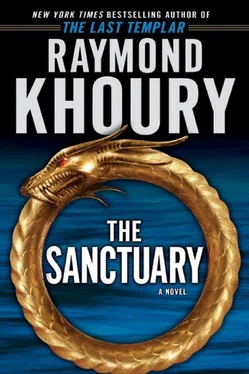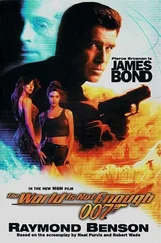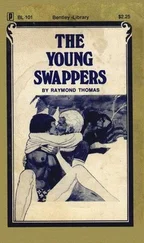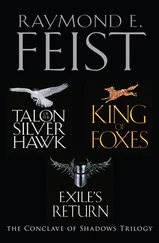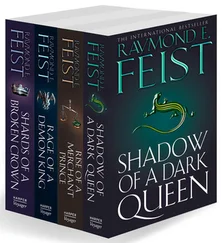“‘We’?” the hakeem asked, waving the handgun questioningly.
“We’re a small group. There are four of us. Carefully selected and approached by the descendant of Sebastian who’s been bequeathed with the…the burden. It’s something my father started.”
“And he, in turn, passed it on to you,” the hakeem surmised.
“Yes.” Kirkwood turned to Evelyn. “That’s why I couldn’t stay with you. I had taken an oath, and it wasn’t a life I could share with anyone. Not when I was taking the elixir. We had to work on fixing it, on figuring out how to make it work for everyone, and our cells, our blood, was part of the experiments. But it all had to be kept secret. We couldn’t risk letting the world know of its existence. If it ever came out, if it were available — and it’s not complicated to prepare, not in its current form anyway — it would turn society on its head. Men living a couple of hundred years, while women only lived a third as long and died off…it would redefine our world, it would rewrite all the rules of our civilization.”
“Oh, I don’t know,” the hakeem mused cynically, keeping a bemused but interested eye on the mokhtar. “Muslims and Mormons take on several wives, and it seems to work for them. This would be the same, only sequentially.”
Evelyn still looked dumbstruck. “Is that how long it gives you? Two hundred years?” she asked.
Kirkwood nodded. “It seems to more or less triple our current life expectancy, if you start taking it once your body’s fully grown. It doesn’t make us immortal. We just age very, very slowly. It slows down the decay in the cells and allows a radically decelerated senescence. Then, eventually, the cells go into free fall.”
The scientist in the hakeem couldn’t resist asking, “How does it work?”
Kirkwood shrugged. “We’re still not sure. It seems to act like a supercharged free-radical scavenger. We’ve found that it changes the way DNA normally wraps itself around some chromosome proteins. As a result, some genes are enhanced while others are repressed. One of the genes that are enhanced is an antioxidative stress gene. But for some reason, something about the chromosomal difference between men and women, at a core mitochondrial level, inhibits its effectiveness in women.”
“It’s like 4-phenylbutyrate,” the hakeem enthused. The drug, recent experiments had shown, had a startling effect on fruit flies, extending their lives dramatically. “Only for humans.”
Kirkwood nodded reluctantly. “Exactly.”
Evelyn’s eyes were riveted on him, telegraphing a cocktail of anger, disappointment, wonder, and horror. “How old are you?” she asked, fear gnawing on the words as they slipped out of her throat.
Kirkwood had already said more than he’d intended, but he couldn’t lie to her. “I was born in 1913,” he reported in a low voice. “Sebastian was my grandfather.”
He tore his eyes away from Evelyn’s shocked expression and glanced at the others. Corben was staring at him coldly, as poker-faced as ever. The mokhtar had been listening intently too, though, as he rubbed his forearms nervously, he was more visibly rattled.
“And so that’s what you’ve been doing, all these centuries,” the hakeem accused Kirkwood indignantly. “Using it secretly in your little coven, depriving the world of life, instead of announcing it, sharing it, inviting the greatest minds in the world to help you fix it?”
“We’ve got some great minds working on it,” Kirkwood protested fiercely. It was a sore point, the source of much guilt. “Some of the most gifted scientists around.”
“Well, maybe you should have had more people working on it,” the hakeem shot back, stabbing the air viciously with his gun to punctuate his words, his finger still worryingly close to the trigger. “Maybe they would have found the solution by now. Instead, you choose to hide it, to selfishly keep it to yourselves.”
“You think this is fun?” Kirkwood lashed out angrily. “Never being able to get close to anyone?” As he spoke, he glanced at Evelyn, and his voice softened. “Watching everyone you love, everyone you care about, wither away and die? Besides,” he added, turning back to the hakeem, “what if there wasn’t a fix? What if they’d never managed to make it work for everyone?”
“Well, clearly, your grandfather seems to think they did,” the hakeem observed, his voice laced with contempt. He nodded to himself, grinding Kirkwood’s words over, thinking things through. When he raised his eyes, a Zen-like resoluteness had spread through them.
“I want the formula,” he said calmly. “And you’ll give it to me, we both know that. But don’t worry. It’ll only be a temporary measure. Something to keep me amused while my men explore these mountains.” He turned to the mokhtar. “What do you say? You think you can point me in the right direction?”
The mokhtar lurched back a step, the blood draining visibly from his face as he butted into one of the hakeem’s men. His eyes wide as saucers, he shook his head repeatedly as beads of sweat materialized at the rim of his headdress.
The hakeem’s features grew dark and threatening as he stepped in closer to him. “An incomprehensible, intriguing man comes down off the mountain, sprouting words in all kinds of languages, carrying a mysterious book in which he writes a final message in a foreign hand. He dies here, in this village. You want me to believe your ancestors weren’t curious about where he came from? You seriously expect me to believe they didn’t go out looking for where he came from?”
The mokhtar was shaking his head repeatedly, darting glances left and right, anywhere but at the tall, hell-bent foreigner who was breathing down on him.
“Well?” the hakeem asked. “Jaawib, ya kalb,” he ordered him viciously. Answer, you dog.
The mokhtar mumbled something. He didn’t know anything.
The hakeem’s eyes narrowed, then he turned to the gunman who was standing guard over the mokhtar’s family and nodded disdainfully at the children. The guard herded them over roughly.
Kirkwood felt his pulse quicken and he instinctively inched forward, but the gunman standing next to him stopped him with a firm hand.
The hakeem raised his gun towards the children. “Which one goes first?” he asked the mokhtar. He aimed at the teenage boy. “The boy? Or maybe”—he swung the gun around recklessly at one of the little girls—“her? Choose one,” he ordered.
A tear streaked down the mokhtar’s cheek, and he muttered, “Please,” as he dropped to his knees.
“Which one?” the hakeem shouted fiercely, his eyes blazing with manic determination.
“Tell him,” Kirkwood yelled out angrily.
The mokhtar shook his head.
“Tell him,” Kirkwood repeated fiercely. “It’s not worth their lives,” he added, glancing at the man’s terror-stricken children.
The mokhtar mopped his face with his hands, then, without looking up, nodded his acquiescence and mumbled, “I’ll take you. I’ll take you where you want to go.”
Just then, something struck one of the hakeem’s men squarely in the chest, yanking him backwards, a red cloud erupting. The man dropped heavily to the ground as the rifle shot’s report echoed in the hills around them.
Several other rounds crackled around the cemetery, scattering the gunmen and their hostages in a panicked frenzy.
Kirkwood darted for Evelyn, but the hakeem was closer to her and snared her just as three rounds struck a nearby gravestone. Kirkwood ducked for cover and could only watch as, with a handgun pressed against Evelyn’s head, the hakeem dragged her to the low wall of the graveyard. The bullets seemed to be coming from behind a house at the edge of the village. One of the hakeem’s men was with him and was intermittently rising from his cover and peppering the source of the gunfire with carefully placed rounds.
Читать дальше
